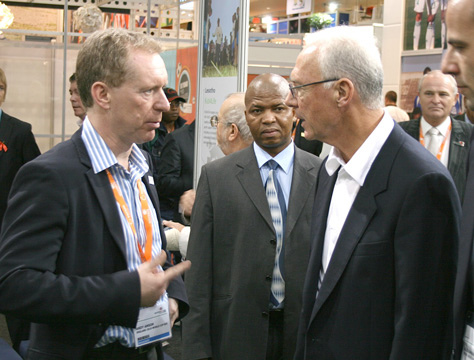By Duncan Mackay
British Sports Internet Writer of the Year
July 15 – FIFA has imposed strict new rules on the nine countries lobbying for the 2018 and 2022 World Cup, including making the bidders explain in writing before they are allowed to talk to any of the 24 Executive Committee members who will vote on the decision.
FIFA told bidders in a statement that they are forbidden from trying to influence voters by “offering benefits for specific behaviour.”
It follows discussions with the Executive Committee, who told FIFA officials that various bid teams approached them “either formally or informally” during the World Cup in South Africa.
FIFA said it wanted to “better monitor these contacts and also preserve the Independence of members in the bidding procedure”.
The announcement follows a series of allegations that Australia, who are bidding for 2022, had offered Executive Committee members gifts.
These included allegations that they had given pearl necklaces to the wives of the FIFA Executive Committee and offered an all-expenses paid trip to one of the voting members.
Australia is one of the favourites to be awarded the 2022 World Cup, along with the United States and Qatar, while Japan and South Korea are also bidding.
Last year the England bid found itself at the centre of controversy after they gave £230 ($375) handbags to the wives of Executive Committee members.
They are battling with Russia and joint bids from Spain and Portugal and Netherlands and Belgium for the 2018 World Cup, a race which the US are still in but are expected to withdraw from soon.
Next week, a FIFA team of technical experts will begin inspection visits of the nine bids to assess their ability to host the tournament.
FIFA bid rules say candidates can give voters gifts of merely symbolic value, which must not influence the bidding process.
Candidates also cannot criticise rival bids or make deals to trade support on the FIFA Executive Committee, with eight of the 24 members representing countries in the bidding races.
The new transparency rule requires all bid teams to register any planned attempt to contact voters or their national association.
“In order to ensure maximum transparency and preserve the independence of the members of the Executive Committee during the bidding procedure, FIFA has sent a circular to the bidding member associations informing them of a new policy which makes it mandatory for all bidders to inform the FIFA Ethics Committee in advance and in writing of any form of communication with a member of the FIFA Executive Committee or a member association of a FIFA Executive Committee member,” wrote FIFA secretary general Jerome Valcke.
“Any violation of this principle will lead to an investigation … with possible sanctions in accordance with the FIFA code of ethics.”
The ethics panel, chaired by former Switzerland international forward Claudio Sulser, who took over from London 2012 Olympic chairman Sebastian Coe, who stood down because he is a member of the England 2018 Board, is finalising its investigation into the behavior of Australia’s bid team.
To read a copy of Valcke’s letter click here.
Contact the writer of this story at zib.l1745207588labto1745207588ofdlr1745207588owedi1745207588sni@y1745207588akcam1745207588.nacn1745207588ud1745207588

